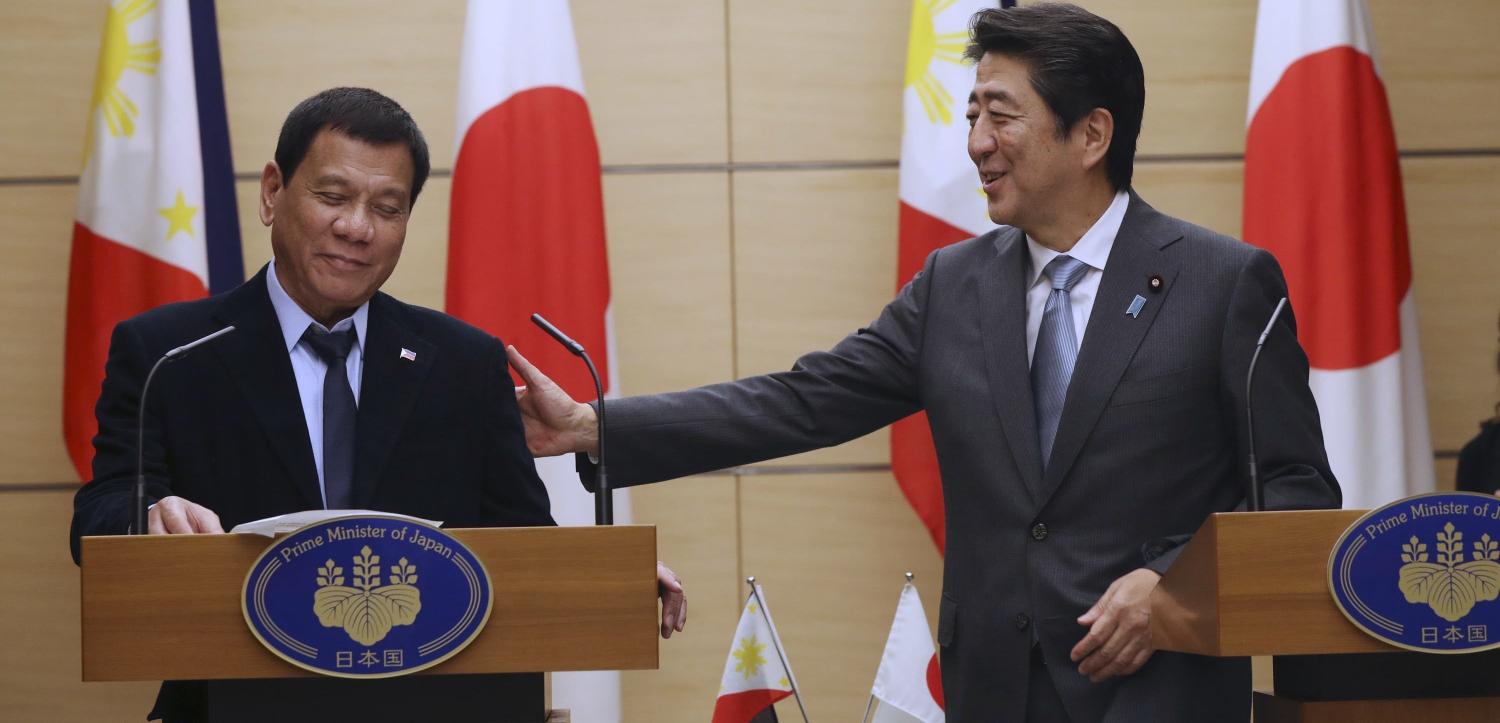Philippine President Rodrigo Duterte’s overtures to China, hostility to the US and lavish praise of Japan have certainly raised some eyebrows. Yet, as surprising as his rhetoric has been, there is no reason to be overly concerned at this juncture. The fissure that has opened between Manila and Washington has given Tokyo an opportunity to play a larger regional role.
Duterte gained much from his recent visits to the Beijing and Tokyo. In the former, he signed investment deals valued at about US$24 billion and reached an agreement with Xi Jinping to resume bilateral talks regarding their South China Sea dispute. In Tokyo, Duterte and Shinzo Abe agreed to continue the trajectory of a stronger strategic partnership. This included roughly US$50 million in loans, two additional patrol vessels (in addition to ten already agreed upon), training aircraft from Japan’s Maritime Self-Defense Forces, capacity-building assistance and enhanced bilateral dialogues and policy consultations. Importantly, they also included references to the importance of freedom of navigation and UNCLOS in settling the South China Sea dispute.
At the same time, Duterte was unwavering in his criticisms of the US. In China, he announced his intention to separate from the US and strengthen relations with China. Then, before leaving Manila to Tokyo, he threatened to revoke the 2014 Enhanced Defense Cooperation Agreement and called on all US troops to leave the Philippines in two years.
This is all very confusing, as it implies a desire to separate from the US alliance, pivot toward China, and continue to strengthen the strategic partnership with Japan as an effort to balance against China. Yet, despite all his blustering rhetoric against the US, he has taken no action to back it up. Instead, Duterte is playing the small-state game of taking advantage of great-power rivalry to gain as much as possible. Indeed, his actions have secured economic and security packages that help the Philippines. This, according to Duterte, is because he is pursuing a more independent foreign policy.
The idea of a more independent Filipino foreign policy is not necessarily a bad thing. After all, it would benefit the US if the Philippines had more amicable relations with China at the same time that two of its Asian allies further strengthened ties, assuming it does not come at the expense of the US.
Moreover, Duterte’s actions do not fundamentally shift the geopolitical situation in the region. While open hostility to the US and overtures to China paint a dire picture of what could be, his trip to Japan demonstrated that he is restrained from pursuing further drift toward China.
Still, Duterte’s rhetoric is not without consequences. As US Assistant Secretary of State Daniel Russel stated, his remarks have been ‘hurtful, confusing, distressing’. Words that call into question the strength of the US-Philippines alliance and a weakening of Filipino pressure on China interferes with regional states’ ability to get China to act in a way more conducive to their interests in the South China Sea. If the country that took China to court over the South China Sea and won suddenly softens its position, it becomes difficult for other states, particularly those with no territorial dispute with China, to push back on actions that violate the court’s ruling. In the very least, it sends mixed messages, thereby diluting regional states’ ability to act in a unified front vis-à-vis China.
This is why Japan is important. Like Duterte, Abe has wanted (and has found) a means to an independent diplomatic space to pursue a number of Japanese interests that do not always harmonise well with Washington’s. Though Abe’s approach is drastically different, it is possible that Duterte views Abe as a likeminded leader.
This translates into Japan’s increased potential as a regional power. Abe has advocated for a Japan willing to make proactive contributions to peace. While questions remain on the specificity of such contributions, a golden opportunity now exists for Japan to play a larger regional role. Abe provided Duterte a venue from which to vent his frustration and remind the US to not take Philippine support for granted.
Looking ahead, Abe needs to remind Duterte of the indispensable value the US plays for regional security. At the same time, Abe needs to be in lockstep with the US to ensure that the Philippines does not obtain any more concessions than necessary, nor allow China any decisive advantages. Should relations between Manila and Washington worsen in the months ahead, Abe should not be shy in explaining to Duterte the geostrategic realities they face. After all, Duterte may not listen to Washington, but it appears he is willing to listen to Tokyo.
Photo: Getty Images/Anadolu Agency

